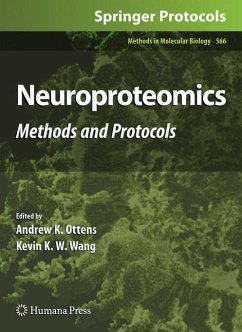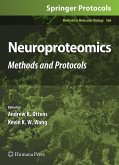With the development of polypeptide ionization processes for mass spectrometry and the rapid processing of large-scale datasets with bioinformatics, researchers now have the tools necessary to propel neuroproteomics research to new levels. In Neuroproteomics: Methods and Protocols, experts in the neurological and analytical sciences present experimental details for applying proteomics to the study of the central nervous system (CNS) and its dysfunction through trauma and disease. Divided into four convenient sections, this collection covers CNS animal models used for neuroproteomics research, methods for separating and analyzing discrete subcomponents of the neuroproteome, large-scale approaches for CNS proteome characterization and quantification, as well as methods that evaluate biofluids and translate neuroproteomic results into clinical platforms. As a volume in the highly successful Methods in Molecular Biology(TM) series, chapters include brief introductions to their respective topics, lists of the necessary materials and reagents, step-by-step, readily reproducible laboratory protocols, and notes on troubleshooting and avoiding known pitfalls.
Authoritative and cutting-edge, Neuroproteomics: Methods and Protocols includes the clear "how-to" information needed to critically assess what can be accomplished in the field and how to best perform and evaluate neuroproteomic experiments in one's own research.
Neuroproteomics: Methods and Protocols presents experimental details for applying proteomics to the study of the central nervous system (CNS) and its dysfunction through trauma and disease. The target audience includes clinical or basic scientists who look to apply proteomics to the neurosciences. Often researchers hear of proteomics without an adequate explanation of the methodology and inherent limitations. This volume conveys where proteomic methodology is in its application to CNS research and what results can be expected. We also address clinical translation of neuroproteomics, specifically in the area of biomarker research. The inception of neuroproteomics capitalized on rapid progress in large-molecule mass spectrometry over the last decade. Two seminal advances have spurred research - development of reliable polypeptide ionization processes and bioinformatics to rapidly process tandem mass spectra for peptide identification and quantification. What has followed is the exponential application of mass spectrometry to proteome characteri- tion across biological and biomedical disciplines. Arguably, the most elaborate proteomic implementation is in studying the CNS, the most enigmatic and complex animal system. Neuroscience is characterized by grandiose questions - what is consciousness, how does thought or memory work. Neuroproteomics researchers, however, have pri- rily involved themselves dysfunction, based on a pressing need (and invariably funding), in answering questions on CNS dysfunction, based on a pressing need (and invariably funding), and because such questions hold more accessible answers. Dysfunction is readily contrasted against normal function and presumably produces a lasting differential protein signature.
Hinweis: Dieser Artikel kann nur an eine deutsche Lieferadresse ausgeliefert werden.
Authoritative and cutting-edge, Neuroproteomics: Methods and Protocols includes the clear "how-to" information needed to critically assess what can be accomplished in the field and how to best perform and evaluate neuroproteomic experiments in one's own research.
Neuroproteomics: Methods and Protocols presents experimental details for applying proteomics to the study of the central nervous system (CNS) and its dysfunction through trauma and disease. The target audience includes clinical or basic scientists who look to apply proteomics to the neurosciences. Often researchers hear of proteomics without an adequate explanation of the methodology and inherent limitations. This volume conveys where proteomic methodology is in its application to CNS research and what results can be expected. We also address clinical translation of neuroproteomics, specifically in the area of biomarker research. The inception of neuroproteomics capitalized on rapid progress in large-molecule mass spectrometry over the last decade. Two seminal advances have spurred research - development of reliable polypeptide ionization processes and bioinformatics to rapidly process tandem mass spectra for peptide identification and quantification. What has followed is the exponential application of mass spectrometry to proteome characteri- tion across biological and biomedical disciplines. Arguably, the most elaborate proteomic implementation is in studying the CNS, the most enigmatic and complex animal system. Neuroscience is characterized by grandiose questions - what is consciousness, how does thought or memory work. Neuroproteomics researchers, however, have pri- rily involved themselves dysfunction, based on a pressing need (and invariably funding), in answering questions on CNS dysfunction, based on a pressing need (and invariably funding), and because such questions hold more accessible answers. Dysfunction is readily contrasted against normal function and presumably produces a lasting differential protein signature.
Hinweis: Dieser Artikel kann nur an eine deutsche Lieferadresse ausgeliefert werden.
From the reviews: "This book provides experimental details about animal models for neuroproteomic research, methods for separating and analyzing discrete subcomponents of the neuroproteome, and CNS proteome characterization and quantification, as well as methods that evaluate biofluids and translate neuroproteomic results into clinical platforms. ... The authors intend the book for basic and clinical researchers, and it will be of much interest to basic scientists, clinical scientists, and students interested in applying proteomics to the neurosciences." (Omer Iqbal, Doody's Review Service, March, 2010)








